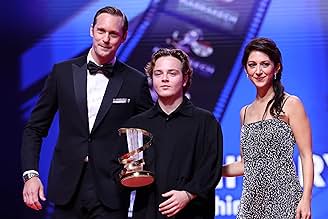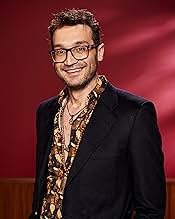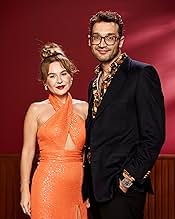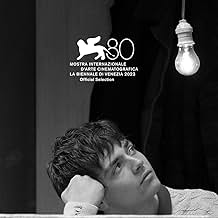Yurt
- 2023
- 1 Std. 56 Min.
IMDb-BEWERTUNG
6,8/10
1053
IHRE BEWERTUNG
Der zwölfjährige Ahmet ist am Boden zerstört, als sein neureligiöser Vater ihn in ein islamisches Wohnheim, eine Jurte, schickt, um muslimische Werte zu lernen.Der zwölfjährige Ahmet ist am Boden zerstört, als sein neureligiöser Vater ihn in ein islamisches Wohnheim, eine Jurte, schickt, um muslimische Werte zu lernen.Der zwölfjährige Ahmet ist am Boden zerstört, als sein neureligiöser Vater ihn in ein islamisches Wohnheim, eine Jurte, schickt, um muslimische Werte zu lernen.
- Auszeichnungen
- 15 Gewinne & 26 Nominierungen insgesamt
Esila Ergun
- Little Girl
- (as Esila Ergün)
Empfohlene Bewertungen
I found this film to be exceptionally well-made. From the actors to the scenes, everything evoked a sense of nostalgia. The realism was top-notch. In my opinion, it beautifully portrayed the struggles of a child torn between Kemalism and Islam. It captured the essence of being caught in the middle, feeling trapped, with remarkable accuracy. These aspects were all very valuable. I was particularly struck by the line, "Who is greater, Allah or Atatürk?" I believe it was a significant statement.
Moreover, the film sheds light on the intense impact of religion and nationalism on children in Turkey, often unnoticed by society. This depiction of children feeling trapped between these powerful forces makes it a crucial piece of work. I hope it reaches a wide audience and that everyone has the chance to see it.
Moreover, the film sheds light on the intense impact of religion and nationalism on children in Turkey, often unnoticed by society. This depiction of children feeling trapped between these powerful forces makes it a crucial piece of work. I hope it reaches a wide audience and that everyone has the chance to see it.
Some films entertain, some impress, and a rare few reach directly into your life and show you a truth you hadn't yet found the words for. Yurt(The Dormitory), Nehir Tuna's hauntingly intimate debut, is one of those rare films. It is a quiet masterpiece-so precise in its storytelling, so understated in its emotion, and yet, somehow, so overwhelmingly powerful.
I watched Yurt and, for the first time in my life, felt as if a film had reached me not just as a viewer, but as a human being living through a particular place, time, and atmosphere. Every frame of this film breathes, pauses, and listens. It does not shout or beg to be noticed-it simply exists, fully and truthfully, in a way that feels more like memory than narrative.
The story follows a young boy sent to a religious dormitory, navigating the silence between belief and doubt, masculinity and vulnerability, discipline and desire. The setting-both literal and psychological-evokes suffocation, but never melodrama. Tuna's brilliance lies in his restraint. Instead of imposing judgment, he invites us to sit beside the boy, to see what he sees, feel what he feels, and above all, to remember.
Visually, the film is exquisite. The use of light and shadow is not just beautiful, but meaningful-it conveys everything that cannot be said aloud in this repressive environment. The color palette reflects the emotional state of its characters-faded, cold, sometimes harsh, sometimes warm enough to hint at the possibility of tenderness. Tuna has an exceptional eye, one that understands not only how to look, but when to look, and when to turn away.
What struck me most was how effortlessly the film communicated the complexity of growing up in a space where power, control, and religious ideology intertwine. There's no simplistic good vs. Evil here. Tuna treats each character-even the sternest authority figures-with a kind of compassionate distance. The dormitory itself becomes a metaphor for a society that demands conformity and punishes softness, but it's never reduced to just that. It's more than a symbol; it's a world-one many of us will find painfully familiar.
As someone who teaches a course on "Political Inclusion and Art" , It captures the nuances of our political and social reality without didacticism, without slogans, and with a depth that only great art can offer. It tells the story of a generation growing up under quiet, everyday pressures-expectations about who they should be, how they should feel, what they should believe. But it tells that story with care, patience, and immense artistic control.
Nehir Tuna is a filmmaker whose lens understands the youth of this country better than any political analysis. His gaze is not just observant, it is human. He does not dramatize suffering-he simply shows it, in its slow, real, and often invisible forms.
Thank you, Nehir Tuna, for making something so precise, so compassionate, and so needed. You've given us a story that lingers-and a silence that speaks louder than anything else.
I watched Yurt and, for the first time in my life, felt as if a film had reached me not just as a viewer, but as a human being living through a particular place, time, and atmosphere. Every frame of this film breathes, pauses, and listens. It does not shout or beg to be noticed-it simply exists, fully and truthfully, in a way that feels more like memory than narrative.
The story follows a young boy sent to a religious dormitory, navigating the silence between belief and doubt, masculinity and vulnerability, discipline and desire. The setting-both literal and psychological-evokes suffocation, but never melodrama. Tuna's brilliance lies in his restraint. Instead of imposing judgment, he invites us to sit beside the boy, to see what he sees, feel what he feels, and above all, to remember.
Visually, the film is exquisite. The use of light and shadow is not just beautiful, but meaningful-it conveys everything that cannot be said aloud in this repressive environment. The color palette reflects the emotional state of its characters-faded, cold, sometimes harsh, sometimes warm enough to hint at the possibility of tenderness. Tuna has an exceptional eye, one that understands not only how to look, but when to look, and when to turn away.
What struck me most was how effortlessly the film communicated the complexity of growing up in a space where power, control, and religious ideology intertwine. There's no simplistic good vs. Evil here. Tuna treats each character-even the sternest authority figures-with a kind of compassionate distance. The dormitory itself becomes a metaphor for a society that demands conformity and punishes softness, but it's never reduced to just that. It's more than a symbol; it's a world-one many of us will find painfully familiar.
As someone who teaches a course on "Political Inclusion and Art" , It captures the nuances of our political and social reality without didacticism, without slogans, and with a depth that only great art can offer. It tells the story of a generation growing up under quiet, everyday pressures-expectations about who they should be, how they should feel, what they should believe. But it tells that story with care, patience, and immense artistic control.
Nehir Tuna is a filmmaker whose lens understands the youth of this country better than any political analysis. His gaze is not just observant, it is human. He does not dramatize suffering-he simply shows it, in its slow, real, and often invisible forms.
Thank you, Nehir Tuna, for making something so precise, so compassionate, and so needed. You've given us a story that lingers-and a silence that speaks louder than anything else.
I really loved this film-visually splendid and carried by outstanding performances. It subtly explores the grip of religious brotherhoods, operating in the shadow of Atatürk's legacy. With meticulous direction and a sensitive narrative, Yurt reveals an unfamiliar Turkey (for me) far from the cosmopolitan image of Istanbul that defines the country for most of people.,
The film is caught between tradition and secularism. We follow the inner turmoil of a young man navigating between these two opposing worlds, torn between the weight of his father's expectations and his desire to live freely, like any other teenager-but also those who don't have the privilege of existing between the two. Very touching and immersive, the film offers a poignant reflection on the search for freedom in a country undergoing profound transformation. A striking and singular work.
In fact, although the Evrenists were thought to be against religious communities in the 90s, they gave the greatest support. In fact, no religious community dormitory was inspected like in the film. If there had been, the nationalists would have used it as material and there would have been a lot of news. In addition, it can be said that the part where secularists attack the dormitories creates its own reality.
In conclusion, I think the film reflects the viewpoint of the Evrenists very well, they tried to stay in the middle by saying a little from them and a little from them.
Even this news provides information about the situation. Shorturl at / 3ytSl.
In conclusion, I think the film reflects the viewpoint of the Evrenists very well, they tried to stay in the middle by saying a little from them and a little from them.
Even this news provides information about the situation. Shorturl at / 3ytSl.
10Alper-72
Yurt is truly an impressive and thought-provoking piece. It masterfully narrates a child's struggle to find themselves within the constraints imposed by society. Nehir Tuna's direction, atmosphere, and storytelling are highly successful.
In particular, the scenes reflecting Ahmet's inner world deeply affected me. On one hand, he is caught between his father's and society's expectations, and on the other, he begins to question the rules after meeting a freer character like Hakan. This internal conflict is portrayed very realistically. The anxiety, helplessness, and curiosity in Ahmet's eyes were palpable in every scene.
The film's way of depicting the environment of the dormitory, the pressure, and how individuality is disregarded was quite striking. The dark and oppressive tones perfectly matched the story's atmosphere. In some scenes, I truly felt as if I were inside that environment.
Additionally, the film subtly weaves in elements of the political atmosphere of the era. Details like Sevinç's use of the word "Aczmendi" remind viewers of 1990s Turkey and its conservative structure. These elements are integrated into the narrative in a natural flow, without being overly blatant.
While watching this film, I couldn't help but put myself in Ahmet's shoes. His internal conflict, the obligation to conform, and the burgeoning desire for freedom all felt incredibly familiar to me.
Ahmet's growth in an environment trying to box him in-caught between the desire to belong and the need to be free-reminded me exactly of my own experiences. That silence, the waiting to be understood without saying anything, questioning whether he is doing the "right" thing with every move he makes...
I was reminded that courage is contagious, but it also comes with a cost. In the final scenes, Ahmet's eyes perhaps showed for the first time that he truly understood things. At that moment, Ahmet was no longer present; I was.
Hakan's fate and Ahmet's inner journey seem to be left for the audience's interpretation. For some, this might appear as an unresolved ending, yet I believe it makes the message the film aims to convey even stronger.
In conclusion, Yurt is not just a coming-of-age story, but a film that questions the impact of society on the individual. It is definitely one of those productions that should be watched.
In particular, the scenes reflecting Ahmet's inner world deeply affected me. On one hand, he is caught between his father's and society's expectations, and on the other, he begins to question the rules after meeting a freer character like Hakan. This internal conflict is portrayed very realistically. The anxiety, helplessness, and curiosity in Ahmet's eyes were palpable in every scene.
The film's way of depicting the environment of the dormitory, the pressure, and how individuality is disregarded was quite striking. The dark and oppressive tones perfectly matched the story's atmosphere. In some scenes, I truly felt as if I were inside that environment.
Additionally, the film subtly weaves in elements of the political atmosphere of the era. Details like Sevinç's use of the word "Aczmendi" remind viewers of 1990s Turkey and its conservative structure. These elements are integrated into the narrative in a natural flow, without being overly blatant.
While watching this film, I couldn't help but put myself in Ahmet's shoes. His internal conflict, the obligation to conform, and the burgeoning desire for freedom all felt incredibly familiar to me.
Ahmet's growth in an environment trying to box him in-caught between the desire to belong and the need to be free-reminded me exactly of my own experiences. That silence, the waiting to be understood without saying anything, questioning whether he is doing the "right" thing with every move he makes...
I was reminded that courage is contagious, but it also comes with a cost. In the final scenes, Ahmet's eyes perhaps showed for the first time that he truly understood things. At that moment, Ahmet was no longer present; I was.
Hakan's fate and Ahmet's inner journey seem to be left for the audience's interpretation. For some, this might appear as an unresolved ending, yet I believe it makes the message the film aims to convey even stronger.
In conclusion, Yurt is not just a coming-of-age story, but a film that questions the impact of society on the individual. It is definitely one of those productions that should be watched.
Wusstest du schon
- WissenswertesYURT is a Turkish-German-French co-production.
Top-Auswahl
Melde dich zum Bewerten an und greife auf die Watchlist für personalisierte Empfehlungen zu.
- How long is Dormitory?Powered by Alexa
Details
Box Office
- Weltweiter Bruttoertrag
- 86.322 $
- Laufzeit1 Stunde 56 Minuten
- Farbe
Zu dieser Seite beitragen
Bearbeitung vorschlagen oder fehlenden Inhalt hinzufügen






















